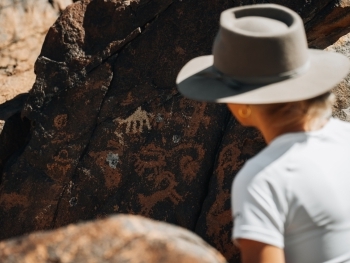Tag: Biblical narratives
Is It Sinful to Get a Hair Transplant? What Does the Bible Say?
For many, hair loss is more than a physical concern—it can also bring up emotional, social, and even spiritual questions. One question that often arises is whether getting a hair transplant is considered sinful or goes against biblical teachings. A...

The Olive Tree: Its Symbolism and Meaning in the Bible
The olive tree holds profound significance in the Bible, embodying peace, prosperity, divine favor, and resilience. This sacred tree is not only one of the most frequently mentioned plants in the Scriptures but also plays a central role in the cultur...
Where is the Negev where Abram went to in Genesis?
Exploring the Negev: Where Abram Journeyed in Genesis In the book of Genesis, we follow the remarkable journey of Abram, who would later become known as Abraham, one of the most iconic figures in biblical history. Among the places mentioned in his tr...

The Bible’s Influence on the Course of History
The Bible, a sacred and revered text for millions around the world, has not only served as a spiritual guide but has also left an indelible mark on the course of human history. Its influence transcends religious boundaries, impacting culture, politic...

The Bible’s Relevance in the 21st Century
In an era marked by technological advancements, cultural shifts, and a rapidly evolving global landscape, the question of the Bible's relevance persists. Contrary to assumptions that it may be outdated, the Bible remains an ever-relevant guide for na...
Abraham’s Journey: Map of Travels from Ur to Canaan
Abraham's Journey: Tracing the Path from Ur to Canaan Abraham's journey is a significant narrative in both biblical and historical contexts. This remarkable journey marks the beginning of a story that would shape the foundation of monotheistic religi...
About
Welcome to Free Bible: Unearthing the Past, Illuminating the Present! Step into a world where ancient history and biblical narratives intertwine, inviting you to explore the rich tapestry of human civilization.
Discover the captivating stories of forgotten empires, delve into the customs and cultures of our ancestors, and witness the remarkable findings unearthed by dedicated archaeologists.
Immerse yourself in a treasure trove of knowledge, where the past comes alive and illuminates our understanding of the present.
Join us on this extraordinary journey through time, where curiosity is rewarded and ancient mysteries await your exploration.
Recent posts
-

João Cotrim de Figueiredo: A Journey from Business Leader to Presidential Hope for a Modern Portugal
João Cotrim de Figueiredo (full name: João Fernando Cotrim de Figueiredo), born on June 24, 1961, in Lisbon, Portugal, is a prominent Portuguese businessman, economist, former politician, and current candidate in the 2026 Portuguese presidential election. At 64 years old, he stands out as a fresh, pragmatic voice in Portuguese... -

Faith Through Art: Bible Craft Ideas for Teens and Children
Faith can take many forms—spoken, sung, or even painted. For teens and children, expressing spirituality through art is a hands-on way to explore biblical themes while having fun and developing creative skills. Crafting allows young believers to interact with stories, symbols, and lessons in a way that feels personal and... -

The Kings of Persia in the Bible: Historical and Theological Perspectives
The Persian Empire looms large in the latter chapters of the Hebrew Bible, not only as a dominant world power but as an unexpected instrument of divine will. While ancient empires like Egypt, Assyria, and Babylon are often depicted as oppressors of Israel, the kings of Persia occupy a more... -

Babylon, Persia, and the Exile: How Iran Shaped Jewish Identity
The Babylonian exile is often seen as one of the darkest moments in Jewish history—a time of destruction, displacement, and despair. Yet, it was also a transformative period, one that reshaped Jewish faith, practice, and identity in profound ways. While Babylon (in modern-day Iraq) was the setting for exile, it... -

Zion and Susa: Two Sacred Cities in Dialogue Through History
At first glance, Zion—the biblical name for Jerusalem—and Susa—the ancient royal city of Persia—seem worlds apart. One is the spiritual heart of the Hebrew Bible and Jewish tradition; the other, a seat of imperial power in ancient Iran, known from royal inscriptions and palatial ruins. Yet within the pages of...
Main Menu
- Ancient Assyrian Social Structure
- Ancient Babylonia
- Ancient Canaan During the Time of Joshua
- Ancient History Timeline
- Ancient Oil Lamps
- Antonia Fortress
- Archaeology of Ancient Assyria
- Assyria and Bible Prophecy
- Augustus Caesar
- Background Bible Study
- Bible
- Biblical Geography
- Fallen Empires - Archaeological Discoveries and the Bible
- First Century Jerusalem
- Glossary of Latin Words
- Herod Agrippa I
- Herod Antipas
- Herod the Great
- Herod's Temple
- High Priest's in New Testament Times
- Jewish Literature in New Testament Times
- Library collection
- Map of David's Kingdom
- Map of the Divided Kingdom - Israel and Judah
- Map of the Ministry of Jesus
- Matthew Henry Bible Commentary
- Messianic Prophecy
- Nero Caesar Emperor
- Online Bible Maps
- Paul's First Missionary Journey
- Paul's Second Missionary Journey
- Paul's Third Missionary Journey
- Pontius Pilate
- Questions About the Ancient World
- Tabernacle of Ancient Israel
- Tax Collectors in New Testament Times
- The Babylonian Captivity
- The Black Obelisk of Shalmaneser
- The Books of the New Testament
- The Court of the Gentiles
- The Court of the Women in the Temple
- The Destruction of Israel
- The Fall of Judah with Map
- The History Of Rome
- The Incredible Bible
- The Jewish Calendar in Ancient Hebrew History
- The Life of Jesus in Chronological Order
- The Life of Jesus in Harmony
- The Names of God
- The New Testament
- The Old Testament
- The Passion of the Christ
- The Pharisees
- The Sacred Year of Israel in New Testament Times
- The Samaritans
- The Scribes
Ancient Questions
- How did the ancient Greeks and Romans practice medicine and treat illnesses?
- What did the Crown of Thorns Symbolize?
- What was the Hostile Plough?
- Why is Augustus Also Called Octavian?
- Do any Archaeological Discoveries Mention Israel?
- Why were the Seven Hills of Rome Significant?
- How did the ancient Persians create and administer their vast empire?
- What is the Extent of the New Testament World?
- What was life like for women in ancient Rome?
- What was the Village of Bethany?
Bible Study Questions
- What is the name of Ramallah in the Bible?
- The 400-Year Prophecy: Unpacking Genesis 15 and the Journey of a People
- Exploring the Good News Bible (GW): Historical Aspects, Comparative Analysis, Impact on Bible Study, and Theological Distinctives
- What is the biblical perspective on marriage and family?
- The Contemporary English Version (CEV): A Detailed Analysis
- The Worldwide English (New Testament) (WE): Historical Overview, Comparison to the ASV, Impact on Bible Study, and Public Domain Implications
- The New Matthew Bible (NMB): Specific Aspects, Comparison with the King James Version, Impact on Biblical Studies, and Modernization Challenges
- A Detailed Historical Analysis of Language Updates in the KJ21: Comparison with Other Versions
- What is the role of community and fellowship in the Christian faith?
- An In-Depth Analysis of the New English Translation (NET): Aspects, Comparisons, Impact, and Implications for Bible Interpretation